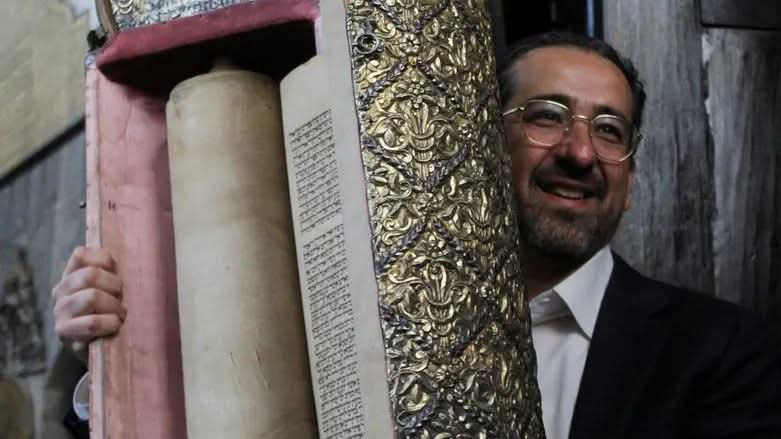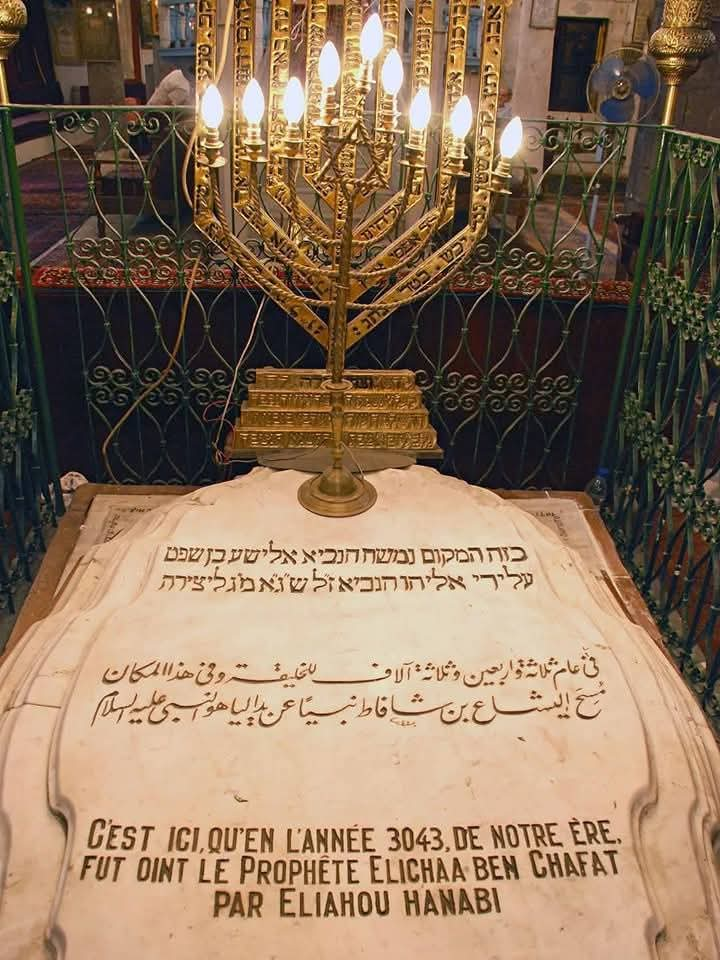After Decades in Exile, Jews of Syria Return To Visit Their Homes, Relive Memories
For the Syrian Jews who toured Damascus with the Syrian Emergency Task Force, the visit brought back memories of thriving Jewish life and hope for a better future
For the first time in nearly thirty years, a group of American Jews originally from Damascus returned to Syria last week. Thanks to the fall of the Assad regime, the group, led by Rabbi Yosef Hamra, was able to tour prominent historical Jewish sites in the Syrian capital and see family homes.
The four-day trip was organized by the Syrian Emergency Task Force, a US-based nonprofit established in 2011 in response to the war in Syria. Participants in the delegation included several Syrian Jews as well as Rabbi Asher Lopatin, a significant Modern Orthodox rabbi who does not have Syrian roots.
Much of Syria’s Jewish community fled the country in the 1990s following restrictions imposed by former Syrian President Hafez Assad, whose son, Bashar Assad, was ousted late last year. The Syrian Jewish community, which, according to tradition, dates back thousands of years, has now dwindled from 300,000 members at the start of the 20th century down to single digits.
After arriving in Damascus, the group visited a former Jewish school, several synagogues, a modern Jewish cemetery, and non-Jewish sites. Among the sites visited was the destroyed Jobar Synagogue, a place of worship believed to be thousands of years old but destroyed during the Civil War.
For years, collective Jewish prayers had ceased in Syria as the community dwindled to just eight people following the recent death of an elderly woman. But with the return of visiting Jews, the few remaining in Damascus were finally able to hold a communal prayer service.
The Jews prayed in the synagogue after many years of deprivation, especially since the small number of Jews remaining in Syria is not enough to hold prayers regularly.
“The Jews prayed in the synagogue after many years of deprivation, especially since the small number of Jews remaining in Syria is not enough to hold prayers regularly,” Rabbi Hamra told The Media Line.
The trip was Hamra’s first visit to his home country in 33 years. He tried to visit Syria a year and a half ago, but the Assad regime did not allow him in.
Hamra’s joy at returning to the place where he once lived was mixed with sadness at not recognizing his old house, which he built himself. “The country has changed a lot,” he told The Media Line.
A leader in Syria’s Jewish community before being forced to flee, Hamra said that “the warmth of the Syrian people” had not changed since his last time in the country.
“The people of Damascus are kind and love one another,” he said. “As Jews, we were oppressed by the former Assad regime, which pressured us to emigrate and seized our properties.”
Give the gift of hope
We practice what we preach:
accurate, fearless journalism. But we can't do it alone.
- On the ground in Gaza, Syria, Israel, Egypt, Pakistan, and more
- Our program trained more than 100 journalists
- Calling out fake news and reporting real facts
- On the ground in Gaza, Syria, Israel, Egypt, Pakistan, and more
- Our program trained more than 100 journalists
- Calling out fake news and reporting real facts
Join us.
Support The Media Line. Save democracy.
He was especially happy to reunite with old Syrian friends. “It’s a wonderful feeling to see people you thought you might never see again. We lived in this city for many years before emigrating, and we have countless memories here,” he said. “We shared bread and water with the people for centuries,” he said.
David Shalhouh, who lives in America, expressed his happiness at seeing his father’s tailor shop, Abu Meiro Shalhouh, in the Al-Amin neighborhood of Damascus.
Hamra recalled the shop from his childhood in the neighborhood, where he had both Jewish and Muslim neighbors.
Damascus was beautiful in those days. We used to buy candy from the small neighborhood shops, and the tailor Abu Meiro was famous in the area. Now, the landmarks of the place have changed.
“Damascus was beautiful in those days,” Hamra recounted. “We used to buy candy from the small neighborhood shops, and the tailor Abu Meiro was famous in the area. Now, the landmarks of the place have changed.”
Bakhour Chamntoub, one of the few members of Syria’s Jewish community who did not flee, also painted a picture of solidarity between Jews and Muslims in Syria. Just days ago, Syria’s Jewish population dropped from eight to seven when an elderly Jewish woman named Mrs. Firdous passed away. Chamntoub said that Firdous’ neighbor, a Palestinian-Syrian Muslim woman, cared for her until her death and that the entire neighborhood mourned her passing.
Chamntoub called on Syrian Jews to return to their country and reclaim their property.
I am very happy to see Jews returning to Damascus. This is our land, and we and the Muslims of Damascus are one people. But the ousted Assad regime caused divisions among Syrians. Today, Jews must return to their homes.
“I am very happy to see Jews returning to Damascus,” he told The Media Line. “This is our land, and we and the Muslims of Damascus are one people. But the ousted Assad regime caused divisions among Syrians. Today, Jews must return to their homes.”
Many Jews who fled Syria are now searching for lost or stolen items, including a valuable Torah scroll reportedly taken from Damascus. The fate of properties owned by the Jewish community or by individual Jews remains a sensitive issue, though the new government has reportedly promised to restore ownership to the rightful heirs.
Chamntoub said that most Jewish properties are still registered under their original owners and that Syria’s new administration has reassured the Jewish community that they will maintain ownership.
Hamra also called on Syrian Jews around the world to return to Syria. “Come to Syria and see for yourselves,” he said. Maybe your perspective will change, and maybe you’ll want to come back.”
Hamra said Syrian Jews have inspected all the properties owned by Jewish individuals or the Jewish community, noting that such property must be returned to its owners and restored.

Henry Hamra, a Damascene Jew visits a synagogue in the Amin neighborhood. (Henry’s Facebook account)
The new Syrian president, Ahmad Al-Sharaa, has maintained regular contact with the Jewish community, Chamntoub said.
A Syrian Foreign Ministry source told The Media Line that the Jewish delegation held meetings with Syrian government officials, including the deputy foreign minister. The source confirmed that Syria’s administration believes that “all sects will play a role in the country’s future.”
Rabbi Hamra’s son, 48-year-old Henry Hamra, noted that the Syrian Foreign Ministry pledged to protect Jewish heritage in Syria, emphasizing the need for government support and security to facilitate the community’s return.
One young Syrian-American Jew who asked to go by the name Alan said he was drawn to the trip because he wanted to see his father’s hometown.
My father used to talk a lot about Damascus and his days there before he left and settled in the United States, where he later passed away. My father told us stories about the harmony and love in Damascus, where people were simple. He told me how people, when they needed bread at night, would knock on their neighbors’ doors to borrow some.
“My father used to talk a lot about Damascus and his days there before he left and settled in the United States, where he later passed away,” Alan, who lives in Brooklyn, told The Media Line. “My father told us stories about the harmony and love in Damascus, where people were simple. He told me how people, when they needed bread at night, would knock on their neighbors’ doors to borrow some.”
Alan was happy to visit his father’s home, which originally belonged to his grandfather, and to see local synagogues. He expressed the intention to restore the family home, the walls of which have collapsed.




